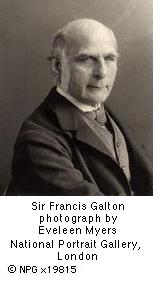Sir Francis Galton
Explorer, anthropologist and eugenist, b. 16 February 1822 (near Birmingham, England), d. 17 January 1911 (Grayshott House, Surrey)
 Francis Galton came from a wealthy family. His parents wanted him to opt for a career in medicine and sent him on a tour of Europe's medical institutions while he was still in his teens. On his return to England he trained at hospitals in Birmingham and London.
Francis Galton came from a wealthy family. His parents wanted him to opt for a career in medicine and sent him on a tour of Europe's medical institutions while he was still in his teens. On his return to England he trained at hospitals in Birmingham and London.
But Galton had developed a passion for travelling. He went to the University of Giessen in Germany to study chemistry but soon left studies to travel through Austria, the Balkan and Greece. He then spent some time at Trinity College in Cambridge and returned to medical studies in London, but as soon as he inherited, in his own words, "a sufficient fortune to make me independent of the medical profession" he turned to travelling as a consuming pastime. An expedition into southwestern Africa to the Kalahari Desert resulted in Galton's election as fellow of the Royal Geographical Society in 1853. Three years later he was admitted to the Royal Society.
Galton published on many topics, but his major interest was evolution of the human race. As a cousin of Charles Darwin he was well acquainted with Darwin's concept. He tried to apply the idea of natural selection to improve the human condition and introduced the term eugenics for the scientific improvement of the human genetic stock.
While Galton's idea was based on the concept that mental as well as physical traits are fully inherited he approached it with as much scientific rigour as was possible at the time. He introduced mathematical statistics for the study of populations and recognized that objective measurement requires the study of identical twins. His did not intend to create a class of intellectually superior beings; his main aim was to raise the intellectual capability of the population as a whole. Eugenics, in his view, was "the new duty which is supposed to be exercised concurrently with and not in opposition to, the old ones upon which the social fabric depends."
The output from the research of Galton and his followers was instrumental in the continued denial of environmental influences on intellectual achievement as evidence accumulated that Galton's primary assumptions could no longer be supported. The racist theories to justify the genocidal elimination of so-called inferior races were the work of Galton's followers. Galton himself was ambivalent, though the legacy of his upper-class upbringing in a colonial power comes through his words on occasions:
- "The feeble nations of the world are necessarily giving way before the nobler varieties of mankind; and even the best of these, so far as we know them, seem unequal to their work. The average culture of mankind is become so much higher than it was, and the branches of knowledge and history so various and extended, that few are capable even of comprehending the exigencies of our modern civilization; much less of fulfilling them. We are living in a sort of intellectual anarchy, for the want of master minds. The general intellectual capacity of our leaders requires to be raised, and also to be differentiated. We want abler commanders, statesmen, thinkers, inventors, and artists. The natural qualifications of our race are no greater than they used to be in semi-barbarous times, though the conditions amid which we are born are vastly more complex than of old. The foremost minds of the present day seem to stagger and halt under an intellectual load too heavy for their powers." (Hereditary Talent and Character, 1865)
The most important of Galton's 9 books and 200 papers are
- Hereditary Genius (1869), a study of the families of eminent men that defines genius as "an ability exceptionally high and at the same time inborn" and suggests that "it would be quite practical to produce a highly gifted race of men by judicious marriages during several consecutive generations."
- Inquiry into Human Faculty (1883), a collection of articles and papers published previously that contains the first mention of the term eugenics.
- Natural Inheritance (1889), which develops advanced statistical methods and applies them to the study of the human species.
References
Dobzhansky, T., A. Robinson, R. C. Richmond and F. H. Osborn (1995) The principles of genetics and heredity, Encyclopaedia Britannica 15th ed.
Encyclopaedia Britannica 15th ed. (1995) Sir Francis Galton.
home
 Francis Galton came from a wealthy family. His parents wanted him to opt for a career in medicine and sent him on a tour of Europe's medical institutions while he was still in his teens. On his return to England he trained at hospitals in Birmingham and London.
Francis Galton came from a wealthy family. His parents wanted him to opt for a career in medicine and sent him on a tour of Europe's medical institutions while he was still in his teens. On his return to England he trained at hospitals in Birmingham and London.